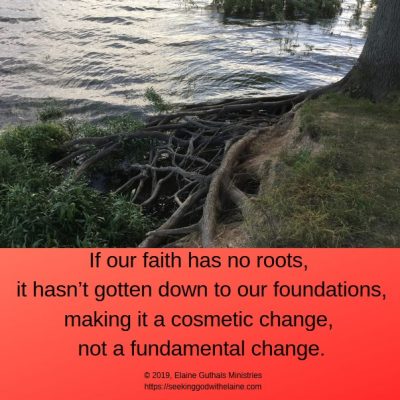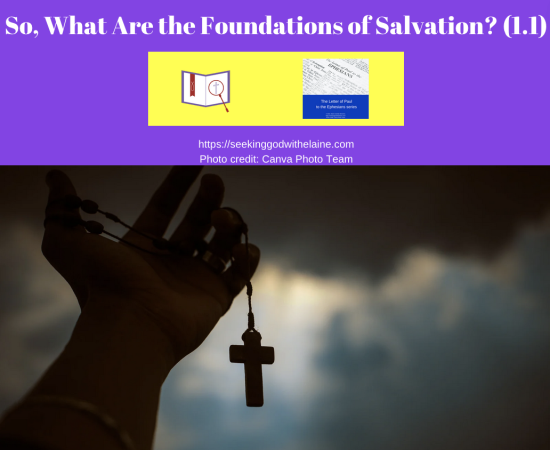It is important to understand the foundations of salvation, regardless if you are someone searching to know God or seeking to grow your relationship with Him. Paul throws out several words in two verses that are crucial for understanding salvation – grace, faith, and works. This devotion ties all of those concepts together.
Nuggets
- Faith isn’t just knowledge and acceptance of that knowledge.
- The evidence of saving faith is the existence of good works in the lives of Jesus’ disciples.
- We have to have the outward and inward profession of faith.
- If our faith has no roots, it hasn’t gotten down to our foundations, making it a cosmetic change, not a fundamental change.
- Jesus called His disciples to be laborers.
Devotions in the The Letter of Paul to the Ephesians series

In the first devotion in the series, we began discussing the foundations of salvation. We saw where Paul said that grace was the foundation on which salvation was built. In the previous devotion, we looked at faith and works.
Paul says that “… by grace you have been saved through faith … not because of works …” (Eph. 2: 8-9 RSV). Is this telling us that we just have to say we believe and do nothing else?
Let's Put It into Context
Here is a running list of nuggets for the series.
So, We Have Faith and Do Nothing?
“For by grace you have been saved through faith. And this is not your own doing; it is the gift of God, not a result of works, so that no one may boast” (Eph. 2: 8-9 ESV)
Faith isn’t just knowledge and acceptance of that knowledge.
What we do or don’t do with the do’s and don’ts is important after God has forgiven us and restored our relationship. The evidence of saving faith is the existence of good works in the lives of Jesus’ disciples: “so as to walk in a manner worthy of the Lord, fully pleasing to him: bearing fruit in every good work and increasing in the knowledge of God” (Col. 1: 10 ESV).
We have to show that the salvation has changed us. We have to utilize the framework God has given us as our guiding principles as a cause-and-effect in our lives. That requires obedience.

No Works = Dead Faith
Remember what James said. “What good is it, my brothers, if someone says he has faith but does not have works? Can that faith save him?” (Jas. 2: 14 ESV emphasis added).
Yes, we have to have the outward profession. But we can’t just say the words, call it faith, and give it lip service.
We also need to have the inward profession. We aren’t just supposed to sit on the porch swing and drink lemonade.
We have to invest in our faith. We have to grow and then put it into practice. If we don’t do that, our faith really isn’t genuine.
I think what James meant here was like the parable Jesus taught about the seeds. “Other seeds fell on rocky ground, where they did not have much soil, and immediately they sprang up, since they had no depth of soil, but when the sun rose they were scorched. And since they had no root, they withered away” (Mt. 13: 5-6 ESV).
We generally think that is referring to trials. When the going gets tough, some get a one-way ticket out of here.
Gotta Grow Our Roots
Jesus explained it this way. “As for what was sown on rocky ground, this is the one who hears the word and immediately receives it with joy, yet he has no root in himself, but endures for a while, and when tribulation or persecution arises on account of the word, immediately he falls away” (Mt. 13: 20-21 ESV).
To me, the key words are it has no root. It hasn’t gotten down to our foundations. It is just a cosmetic change; it isn’t a fundamental change.

But what happens to those who maybe had an agenda when they made a profession of faith? What about those who find they don’t want to give up their sins?
They don’t grow their root for whatever reason. So, they don’t have works to show for their faith — even though they weren’t undergoing trials.
Because, let’s face it. It takes time to read the Bible, pray, worship, meditate …. And we’re supposed to do this for the long haul. If we don’t do it, we don’t grow our roots.
Then James goes on to talk about no-root people. “Do you want to be shown, you foolish person, that faith apart from works is useless? Was not Abraham our father justified by works when he offered up his son Isaac on the altar? You see that faith was active along with his works, and faith was completed by his works; and the Scripture was fulfilled that says, ‘Abraham believed God, and it was counted to him as righteousness’ — and he was called a friend of God. You see that a person is justified by works and not by faith alone” (Jas. 2: 20-24 ESV). Our works are doing whatever God has called us to do.
We Are Laborers
James knew that Jesus had called on His disciples to be laborers. “Then he said to his disciples, ‘The harvest is plentiful, but the laborers are few’” (Mt. 9: 37 ESV). Laborers – workers – the ones who actually went out into the fields and cut the wheat, picked the corn, and gathered in the beans — or whatever the crop was..
Let’s take this agricultural discussion one step further. “You can identify them by their fruit, that is, by the way they act …” (Mt. 7: 16 NLT). Yes, Jesus was talking about false teachers here.
But can’t this be applied to false disciples, also? Let’s look again at the fruits of the spirit. We said before that the fruits of the spirit show a pure heart: “… love, joy, peace, patience, kindness, goodness, faithfulness, gentleness, self-control; against such things there is no law.” (Gal. 5: 22-23 ESV).

Okay, faith is a fruit. Self-control is also an internal fruit. Peace and joy have dual expression. But look at all the rest. If you don’t show love, patience, kindness, goodness, and gentleness externally, do you really have them? Jesus said those are our identifiers.
To read a related devotion, click the button below.
We can do works because we think it needs to be done and that it will improve someone else’s lives. Works through faith are done because this is what God has called us to do to further His kingdom. God wants us to have a living, breathing faith.
The way I see it is, what is our motivation? Are we doing something in response to God’s directions — either laws and commandments or through His promptings? Or are we going lone wolf and doing something of our own volition?
I like the term that Stark used: holiness of heart and life. As James said, we can’t just say we have faith (Jas. 2: 14). We have to live it. We live it by our works.
Resource
Paul was looking at the foundation. James was looking at how we use what we have built. Jesus never meant to allow us to keep on living our lives as we had been. He wants His disciples to change their lifestyles to better align with God’s laws and commandments. That takes work – internally and externally.

Making the Connections
So, what does all we have talked about in the last three devotions mean?
The riches of grace are salvation and faith. That makes a strong foundation for our relationship with God.
Grace is the foundation for salvation, and faith is the foundation for works. We show our salvation through the works we do in faith.
Jesus taught about building on foundations. The house built upon the rock stood firm while the house built upon the sand fell (Mt. 7: 24-27).
But look at this. When talking about the Wilderness Wanderers, Paul said, “For I do not want you to be unaware, brothers, that our fathers were all under the cloud, and all passed through the sea, and all were baptized into Moses in the cloud and in the sea, and all ate the same spiritual food, and all drank the same spiritual drink. For they drank from the spiritual Rock that followed them, and the Rock was Christ” (I Cor. 10: 1-4 ESV emphasis added).
Paul also said, “For no one can lay a foundation other than that which is laid, which is Jesus Christ” (I Cor. 3: 11 ESV emphasis added).
Our foundation is supposed to be built on the Rock, Jesus Christ, our Lord and Savior. All we believe, all we trust, all we do is to glorify Christ, who in turn glorifies God.
Let’s go back to Zechariah 7: 9 from the first devotion in the series. It says, This is what the LORD Almighty said: ‘Administer true justice …’” (NIV). Today’s worldview does not believe kindness has any room to include justice in it.
Disciples of Jesus have to submit to the correcting hand of God. That is what is preparing us for our eternal life.
How Do We Apply This?
We have to make a choice. Are we going to step out in faith and accept God’s gift of salvation or are we going to follow the worldview?
Once we choose to accept God’s gift of salvation, we have to choose to do that every day.
We have to grow in our knowledge of Him (II Pet. 3: 18). God will be right there to guide us in doing that.
Father God. We accept Your gift of salvation. Help us to grow in knowledge of You. Strengthen our faith in You as we read, study, and meditate on Your Word. Help us to hear You when we pray — and any time You speak to us. Help us to perform the tasks to which You have called us. Amen.
What do you think?
Leave me a comment below (about this or anything else) or head over to my Facebook group for some interactive discussion.
If you don’t understand something and would like further clarification, please contact me.
If you have not signed up for the email daily or weekly providing the link to the devotions and the newsletter, do so below.
If God has used this devotion to speak with you, consider sharing it on social media.